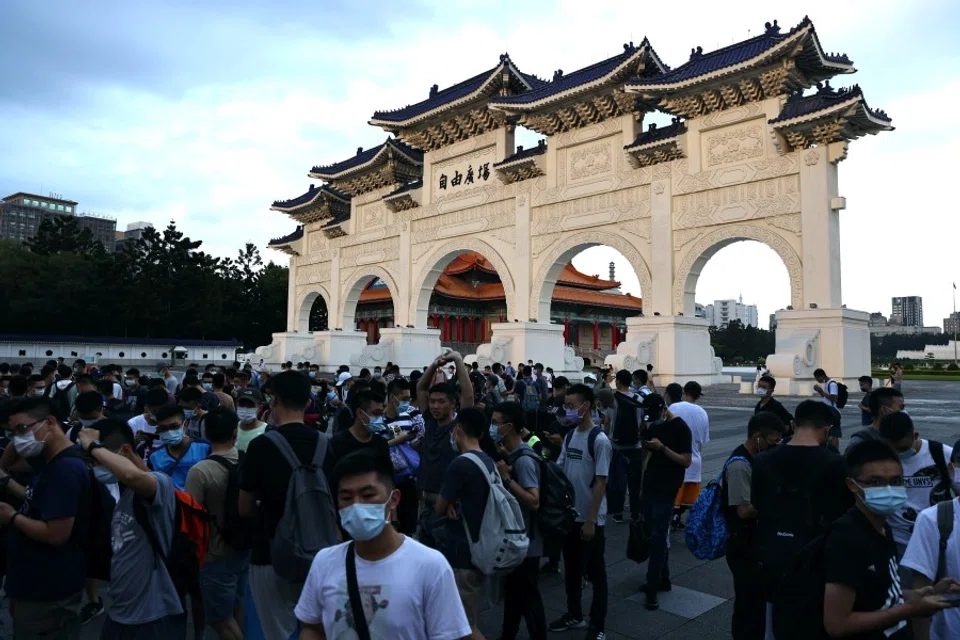Taiwanese youth: Taiwan not the 'most dangerous place on earth'
People often compare Taiwan and mainland China, and even the Taiwanese knock themselves for lagging behind, especially in terms of economy and business. One frequent comment is that Taiwan is content with "small blessings". Social entrepreneur and columnist Jack Huang disagrees, saying that the youth in Taiwan are channelling their energy into worthy causes and working hard towards building an inclusive society and a better world for everyone.

The Economist recently described Taiwan as the "most dangerous place on earth". Those in Taiwan are used to being intimidated and threatened. But given the global instability wreaked by the China-US trade war then the pandemic, extreme populism around the world, and the leadership transition from Trump to Biden which has yet to stabilise, Western media seems to have a motive for stoking the Taiwan Strait fire.
However, a closer look shows that there is nothing much new in the analysis. Apart from repackaging old arguments and talking about the US's Asia strategy in relation to the first island chain as if the Cold War is still on, the more noteworthy points pertain to TSMC's position as a global leader in semiconductors and its huge influence which can set off a domino effect in the global technology sector, and the need for China, the US and others to be very careful when competing in this sector.
From the previous US-Soviet confrontation to today's US-China standoff, there has been overt and covert competition between powers. And whether or not there is fighting, the "essay writing competition" between China, the US, and Taiwan - along with other stakeholders - has been going on in full swing for years.

The war of words continues
For many years, major US think tanks, The Economist, China's state media, Taiwan's commentators and political channels, as well as other nosy Chinese language media have been arguing. And that is not even counting the strange conspiracy theories and fake news on social media such as Line, WeChat, and Facebook, most of which is just noise in the internet era and not worth mentioning.
... looking at per capita GDP, commodity price index, inflation, and other intangible indicators, it seems that Taiwan is also not doing too badly. At least, it is not a "ghost island" on the brink, as media of a certain bent are saying.
Taiwan is a nice place; this little island is situated at just the right geographical spot. In any Taiwanese city, life is convenient, with criss-crossing high-speed railways and diverse cultures from north to south made up of Hokkiens, Hakkas, post-1949 era migrants, indigenous people, and a growing number of new residents from Southeast Asia, Europe, and the US in recent years.
In terms of the economy, compared to its neighbouring big brother mainland China, looking purely at GDP figures, Taiwan is indeed doing far less well. However, looking at per capita GDP, commodity price index, inflation, and other intangible indicators, it seems that Taiwan is also not doing too badly. At least, it is not a "ghost island" on the brink, as media of a certain bent are saying.
I remember my friend L - a Taiwanese based in Shanghai - relating a conversation he had with his friend from mainland China.
"One day I was chatting with a colleague who asked me whether Taiwan was a fun place. I said it's pretty good, Taipei is convenient; within about an hour of travelling, you can get to the mountains or the sea, traverse the city and nature, and see the sights of the past and present. Other cities are also unique with well developed infrastructure, and the tourist sights are worth seeing.

"And then my colleague said, 'But it's so troublesome to get into Taiwan. How come your government puts in so many restrictions? Look at how easy it is for Taiwanese to come to mainland China. I think I'll go after reunification.' And I said, by that time, Taiwan won't be Taiwan any more; just look at Hong Kong. Is it still Hong Kong? My colleague said, 'I think Hong Kong is fine, what's wrong with it?' And then the conversation trailed off."
Of course, this anecdote would spark all sorts of discussions, and it is not my intention to stir conflict between people with different viewpoints - good or bad is a subjective feeling. However, objectively speaking, is Taiwan really not very competitive? Does it really not match up to its strengthening big brother or other developing Chinese communities? Has it thoroughly failed in every way? Maybe, but maybe not.
The blessings we want are those that will be enjoyed by people today, tomorrow, ten years and fifty years from now, down to our children and grandchildren.
Young Taiwanese conserving energy for the important things
Young people in Taiwan must have often heard from their elders or the media: "Look at how advanced Shanghai is, with all the skyscrapers in Pudong. The young people in mainland China are so driven, China's companies are doing so well..." And then comes the switch: "Taiwan only thinks about small blessings, its young people are not competitive... Taiwan is all about domestic consumption, its economic development is stagnant..."
Of course, for better or worse, this comparison does have its basis. But to generally conclude that Taiwan is hopeless seems too harsh. I once wrote in an earlier article:
"Taiwan's young people do indeed think about small blessings, but that is in the context of the big picture. We want blessings to include everything and everyone - people from far away, people of various skin colours who speak different languages, those who are yet to be born, the leopard cat and white dolphin, even the trees along the road and rivers in the valleys. The blessings we want are those that will be enjoyed by people today, tomorrow, ten years and fifty years from now, down to our children and grandchildren.

"This might be Taiwan's sort of ambition, or rather, our positivity and competitiveness. We may not be the wealthiest, standing in the limelight and enjoying the world's envy and jealousy, but we are determined to plant one small seed at a time, and let these seeds grow into a forest ten years, a hundred years from now. The trees and grass will thrive and benefit everyone so that rich or poor, regardless of status or any natural deficiencies, everybody can live in a fair and mutually respectful society."
Taiwan has the highest number of B Corps in Asia, which do not just earn money but earn it meaningfully, to improve society. Taiwan also has a diverse civil society, with NGOs that get involved in various issues and can speak freely, and concern themselves with disadvantaged groups...
So, Taiwan has the highest number of B Corps in Asia, which do not just earn money but earn it meaningfully, to improve society. Taiwan also has a diverse civil society, with NGOs that get involved in various issues and can speak freely, and concern themselves with disadvantaged groups such as young people whose parents are not in the picture, the rights of people on death row, even the ocean, stray cats and dogs, leopard cats, algal reefs, and the trees on Alishan. Perhaps many young people today still lack direction, but there are also many - not just young people - who have great qualities and are quietly doing very meaningful work.

Having been posted overseas before, I got to know several Taiwanese living all over the world. We shared information, including a friend who sent some video clips and articles from mainland China, which were well received for their keen analyses and accurate arguments. The friend who shared these sighed, "Look at how quickly mainland China has caught up, it is so far ahead of Taiwan... even the views of someone from the People's Liberation Army is so aware of the big picture, with such logical analyses..."
I had no intention of arguing the point, but out of curiosity, I watched the videos very seriously. They were indeed well produced - putting aside the differences in viewpoints, the dialogue between the host and guests did offer much food for thought. However, does Taiwan not have such people and such content production? Yes, it does. For politics, there is whogovernstw.org; for economics, there is TalkEcon; for Taiwanese history, there is Taiwan Bar; for philosophy, there is phiphicake.blogspot.com; and for jobs and careers, there is the.shirt.media (一件衬衫).
There are many such programmes, and they are produced by young people who use their professionalism and knowledge and work with various teams from the film crew, to writers, to planning, to online publicity, to come up with creative content with depth - these are the young people who are tagged as wanting only "small blessings".

Small blessings with a big heart
When it comes to digital content creation, it makes little sense to compare quality. However, I believe that in a place that values freedom and democracy, the people's creativity, ideas, and productions, as well as public distribution, are in theory not limited too much by regulations, and are more likely to see bold innovations. Is Taiwan's democracy a little messy? Yes, definitely. Internal conflicts reduce public efficiency, while the clash of political ideologies has led to some ridiculous and laughable disputes. Then there are those who fake claims to freedom of speech but work for their own interests and readily spark political confrontations. This is what we need to face up to, and keep improving on.
Even if each time there is only a small improvement, we know that it takes time to develop the quality of the people. I believe in John Stuart Mill's understanding of freedom. He felt that when everybody gets to speak, erroneous views will be corrected, and the correct views will surface.
If someone's view is correct and they want to express it, then let them speak up; it will do everyone good. And even if their view is wrong, let others correct them, and we will have a better idea of what is correct.
The Taiwanese may be frequently overlooked, but they will not be easily crushed.
Now, back to the point about Taiwan being in danger. This danger comes from the threat of regional conflict or even war. Taiwan has to wisely face and handle these challenges with confidence and composure; it does not need to beg and grovel, toe the line or put itself down by constantly ruminating on what it lacks.
Crisis can also be an opportunity. Amid powerful friends with evident strengths in many areas, Taiwanese can humbly learn and engage with them, while not forgetting that they themselves also possess strong points, albeit quiet ones. The Taiwanese may be frequently overlooked, but they will not be easily crushed.
Related: Will China take Taiwan by force within six years? Taiwanese think not and experts are worried | Chinese academic: A 'reunification by force' would be Taiwan's last | The PLA's game of deterrence in the Taiwan Strait | Taiwan's booming semiconductor industry plays crucial role on world stage | Faced with a shortage of water, electricity and vaccines, can Taiwan still deliver the chips?



![[Photos] Fact versus fiction: The portrayal of WWII anti-Japanese martyrs in Taiwan](https://cassette.sphdigital.com.sg/image/thinkchina/3494f8bd481870f7c65b881fd21a3fd733f573f23232376e39c532a2c7593cbc)

